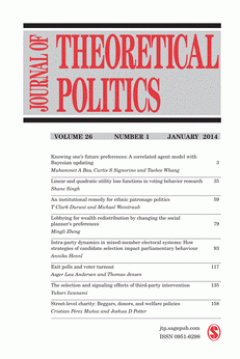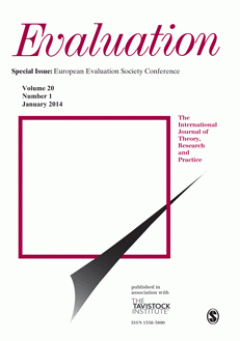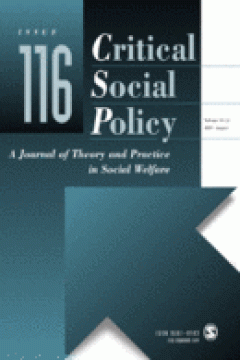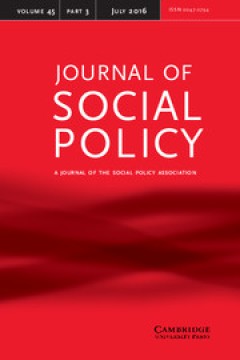Filter by

Heresthetics and choice from tournaments
Moser et al. provide a formalization of heresthetics, the “art of political strategy”, in collective choice settings. In doing so they introduce the heresthetically stable set as the set of outcomes least susceptible to manipulation of issue dimension. In this note we correct a small error in the original paper, and close several open questions asked there in. We examine the heresthetical…
- Edition
- Volume 28, Issue 3, July 2016; pp. 385–407
- ISBN/ISSN
- 0951-6298
- Collation
- -
- Series Title
- Journal of Theoretical Politics
- Call Number
- -

Scope and precedent: judicial rule-making under uncertainty
I develop a formal model of Supreme Court opinion-writing in an environment of uncertainty. In particular, the model captures how the Supreme Court will optimally design the specificity of its legal rules. The model focuses on the tradeoff between more precise rules which are controlling in a smaller subset of cases against less precise rules, which have wider applicability but yield le…
- Edition
- Volume 28, Issue 3, July 2016; pp. 353–384
- ISBN/ISSN
- 0951-6298
- Collation
- -
- Series Title
- Journal of Theoretical Politics
- Call Number
- -

Social choice and popular control
In democracies citizens are supposed to have some control over the general direction of policy. According to a pretheoretical interpretation of this idea, the people have control if elections and other democratic institutions compel officials to do what the people want, or what the majority want. This interpretation of popular control fits uncomfortably with insights from social choice …
- Edition
- Volume 28, Issue 2, April 2016; pp. 331–349
- ISBN/ISSN
- 0951-6298
- Collation
- -
- Series Title
- Journal of Theoretical Politics
- Call Number
- -

Do parties converge to the electoral mean in all political systems?
Many formal models suggest that parties or candidates should locate at the electoral mean. Yet, there is no consistent evidence of such convergence across political systems. Schofield’s (2007) Valence Theorem proves that when valence differences across parties are large, there is non- convergence to the mean. Convergence to the mean depends on the value of the convergence coefficient, c.…
- Edition
- Volume 28, Issue 2, April 2016; pp. 288–330
- ISBN/ISSN
- 0951-6298
- Collation
- -
- Series Title
- Journal of Theoretical Politics
- Call Number
- -

An empirical stochastic model of Argentina’s Impossible Game (1955–1966)
Argentine politics from 1955 to 1966 was characterized by the conflict between the Peronists and the anti-Peronists. While each camp could veto the other’s project, neither could advance their own agenda. In his canonical interpretation, O’Donnell (Modernization and Bureaucratic- Authoritarianism. Berkeley, CA: Institute of International Studies, University of California, 1973) concluded…
- Edition
- Volume 28, Issue 2, April 2016; pp. 266–287
- ISBN/ISSN
- 0951-6298
- Collation
- -
- Series Title
- Journal of Theoretical Politics
- Call Number
- -

Increasing rents and incumbency disadvantage
Recent empirical studies have found a incumbency disadvantage in many developing democracies, in marked contrast with the well-known incumbency advantage in the US and other developed democracies. We know considerably less about incumbency disadvantage than incumbency advantage. In a simple principal-agent framework, I explore the role of a prominent feature of developing democracies – …
- Edition
- Volume 28, Issue 2, April 2016; pp. 225–265
- ISBN/ISSN
- 0951-6298
- Collation
- -
- Series Title
- Journal of Theoretical Politics
- Call Number
- -

Distributive politics, the electoral connection, and the antebellum US Congre…
We investigate the rise of federal military pensions in the antebellum US Congress to examine whether key aspects of the contemporary electoral connection were present in earlier historical eras. Overall, the political responses of members of Congress to pressures for military service pensions reveal that the quest for credit-claiming opportunities significantly shaped the adoption and ev…
- Edition
- Volume 28, Issue 2, April 2016 ; pp. 192–224
- ISBN/ISSN
- 0951-6298
- Collation
- -
- Series Title
- Journal of Theoretical Politics
- Call Number
- -

Exploring ethical issues and conditions for institutionalizing evaluation i…
When addressing evaluation ethics, both the literature and existing ethics codes focus on evaluators’ conduct. This risks undermining the evaluator’s position vis-ŕ-vis programme managers and evaluation commissioners, without addressing major ethical issues. This study indicates that the factors influencing ethical choices include institutional settings and organizational arrangements. …
- Edition
- Volume 22, Issue 2, April 2016; pp. 149–167
- ISBN/ISSN
- 13563890
- Collation
- -
- Series Title
- Evaluation
- Call Number
- -

A framework for improving the responsiveness of policy through development …
Development evaluation, which prioritizes poverty reduction, potentially can increase the responsiveness of policy to poor people. Power imbalances, however, mean that although development evaluation has the possibility to be an important contributor to poverty reduction efforts, the interests of the poor are often excluded from the process of evaluation. In this article a framework tha…
- Edition
- Volume 22, Issue 2, April 2016; pp. 245–258
- ISBN/ISSN
- 13563890
- Collation
- -
- Series Title
- Evaluation
- Call Number
- -

The role of new information and communication technologies in equity-focuse…
ICT is being rapidly introduced into development evaluation. Evaluators need to keep abreast of these important evolutions in the field in order to stay current and continue shaping the future of development work through their practice. ICT is helping to resolve some age-old issues that evaluators face, especially in terms of time, resources and data quality constraints. At the same tim…
- Edition
- Volume 22, Issue 2, April 2016; pp. 228–244
- ISBN/ISSN
- 13563890
- Collation
- -
- Series Title
- Evaluation
- Call Number
- -

Are social mechanisms usable and useful in evaluation research?
This article reflects on the potential contribution of a social mechanism approach to evaluation research, based on the empirical analysis of three evaluations of European policies. A methodological framework for carrying out evaluation based on this approach is put forward that help identify questions to be answered and steps in a working method to be followed. More specifically, the a…
- Edition
- Volume 22, Issue 2, April 2016; pp. 209–227
- ISBN/ISSN
- 13563890
- Collation
- -
- Series Title
- Evaluation
- Call Number
- -

Evaluation in management by objectives: A critical analysis of Sweden’s n…
This article investigates what can be achieved by one particular management by objectives system – i.e. the Swedish National Environmental Quality Objectives system and its evaluation function. A critical programme theory analysis is first developed to reconstruct the programme theory of the National Environmental Quality Objectives system. Next, the robustness of the programme theory i…
- Edition
- Volume 22, Issue 2, April 2016, 2016; pp. 190–208
- ISBN/ISSN
- 13563890
- Collation
- -
- Series Title
- Evaluation
- Call Number
- -

Evaluation units as knowledge brokers: Testing and calibrating an innovative …
Evaluation units, located within public institutions, are important actors responsible for the production and dissemination of evaluative knowledge in complex programming and institutional settings. The current evaluation literature does not adequately explain their role in fostering better evaluation use. The article offers an empirically tested framework for the analysis of the role o…
- Edition
- Volume 22, Issue 2, April 2016; pp. 168–189
- ISBN/ISSN
- 13563890
- Collation
- -
- Series Title
- Evaluation
- Call Number
- -

Using Contribution Analysis to evaluate small & medium enterprise support po…
This research illustrates a pragmatic approach to evaluating the small and medium sized enterprise policy support in small or intermediate N research situations. A public interest perspective is taken. The suggested approach is most appropriate in settings where, for a variety of reasons, a study is unable to meet the requirements of a true experimental design (e.g. random assignment, e…
- Edition
- Volume 22, Issue 2, April 2016; pp. 129–148
- ISBN/ISSN
- 13563890
- Collation
- -
- Series Title
- Evaluation
- Call Number
- -

Journal of Theoretical Politics, Volume 28, Number 3, July 2016
- Edition
- -
- ISBN/ISSN
- 0951-6298
- Collation
- -
- Series Title
- -
- Call Number
- -
- Edition
- -
- ISBN/ISSN
- 0951-6298
- Collation
- -
- Series Title
- -
- Call Number
- -

Journal of Theoretical Politics, Volume 28, Number 2, April 2016
- Edition
- -
- ISBN/ISSN
- 0951-6298
- Collation
- -
- Series Title
- -
- Call Number
- -
- Edition
- -
- ISBN/ISSN
- 0951-6298
- Collation
- -
- Series Title
- -
- Call Number
- -

Evaluation : The International Journal of Theory Research and Practice, Volum…
- Edition
- -
- ISBN/ISSN
- 13563890
- Collation
- -
- Series Title
- -
- Call Number
- -
- Edition
- -
- ISBN/ISSN
- 13563890
- Collation
- -
- Series Title
- -
- Call Number
- -

Critical Social Policy, Volume 36, Number 3, Issue 128, August 2016
- Edition
- -
- ISBN/ISSN
- 02610183
- Collation
- -
- Series Title
- -
- Call Number
- -
- Edition
- -
- ISBN/ISSN
- 02610183
- Collation
- -
- Series Title
- -
- Call Number
- -

To what Extent do Australian Health Policy Documents address Social Determi…
Evidence on social determinants of health and health equity (SDH/HE) is abundant but often not translated into effective policy action by governments. Governments’ health policies have continued to privilege medical care and individualised behaviour-change strategies. In the light of these limitations, the 2008 Commission on the Social Determinants of Health called on health agencies to…
- Edition
- Volume 45 - Issue 3 - July 2016, pp. 545-564
- ISBN/ISSN
- 0047-2794
- Collation
- -
- Series Title
- Journal of Social Policy
- Call Number
- -

Payday lending in the UK: the regul(aris)ation of a necessary evil?
Concern about the increasing use of payday lending led the UK's Financial Conduct Authority to introduce landmark reforms in 2014/15. While these reforms have generally been welcomed as a way of curbing ‘extortionate’ and ‘predatory’ lending, this paper presents a more nuanced picture based on a theoretically-informed analysis of the growth and nature of payday lending combined with ori…
- Edition
- Volume 45 - Issue 3 - July 2016, pp. 527-543
- ISBN/ISSN
- 0047-2794
- Collation
- -
- Series Title
- Journal of Social Policy
- Call Number
- -
 Computer Science, Information & General Works
Computer Science, Information & General Works  Philosophy & Psychology
Philosophy & Psychology  Religion
Religion  Social Sciences
Social Sciences  Language
Language  Pure Science
Pure Science  Applied Sciences
Applied Sciences  Art & Recreation
Art & Recreation  Literature
Literature  History & Geography
History & Geography